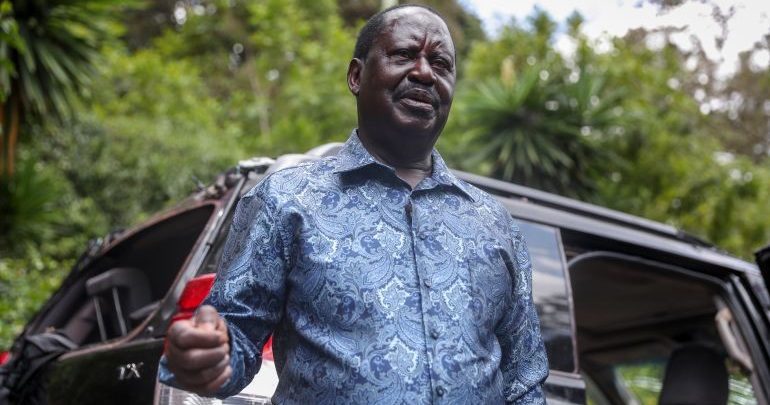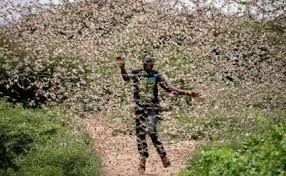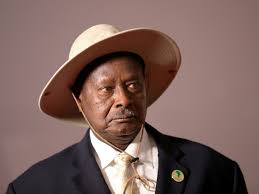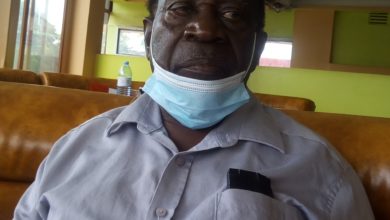
Global Politics
Kenyan opposition leader Raila Odinga dies of heart attack in India at 80
6 times, his life was saved by Ugandans fugitive, first was in 2005, two snipes hired to killed him
The former Kenyan PM had collapsed during a morning walk in southern India, where he was receiving medical treatment.
My personal friend Raila Amollo Odonga passed on, I have saved his life six times, the first one was in 2005, when his enemies nickname the bullet which was meant to kill him 2005 bullet assassination. second times was in year 2007, during aftermath of Kenyans election, he was about to hung. the rest is history.
Luo Kingmaker, dong iwot maber
Kenyan opposition leader Raila Odinga died of a heart attack [File: Brian Inganga/AP Photo]
Kenyan opposition leader Raila Odinga, a key figure in African politics, has died at the age of 80 during a trip to India for medical treatment, according to local police and hospital officials.
The former prime minister, who as opposition leader had waged five unsuccessful presidential campaigns between 1997 and 2022, had suffered a heart attack, the Devamatha Hospital in the southern Indian state of Kerala confirmed to The Associated Press news agency on Wednesday.
Odinga was a dominant force in Kenyan politics, and his death will leave a significant leadership vacuum within the country’s political opposition ahead of elections in 2027.
An Indian police official told the AFP news agency that Odinga had been on a morning walk, accompanied by his sister, daughter, a personal doctor, and Indian and Kenyan security officers, when he collapsed.
“He was rushed to a nearby private hospital, but was declared dead,” said Krishnan M, additional superintendent of police in Ernakulam, Kerala.
Unnamed officials in Odinga’s office also confirmed the death to news agencies.
Indian newspaper Mathrubhumi had earlier reported the death, adding that Odinga had been undergoing medical treatment in the state’s Kochi city.
Sreedhareeyam Ayurvedic hospital in Koothattukulam in India’s southern state of Kerala, where Raila Odinga had been undergoing treatment [AP Photo]
Pro-democracy campaigner
Born on January 7, 1945, Odinga was the son of the country’s first vice president after independence in 1963.
A member of the Luo tribe, he spent most of his adult life in politics, including time in exile and eight years in prison as a pro-democracy campaigner – but never achieved his goal of becoming Kenya’s president.
Advertisement
Odinga first entered parliament in 1992, and ran unsuccessful presidential campaigns in 1997, 2007, 2013, 2017 and 2022.
Get instant alerts and updates based on your interests. Be the first to know when big stories happen.
He claimed to have been cheated of victory in the last four elections, and led protests after the disputed 2007 election that led to Kenya’s most serious bout of political violence since independence.
About 1,300 people were killed and hundreds of thousands displaced from their homes in the battles. Large-scale protests also broke out during the 2017 election, in which the Supreme Court annulled the results of an initial poll, and Odinga withdrew from the follow-up, saying it would not be free and fair.
Odinga’s pro-democracy activism over the years helped drive two of the country’s most significant political reforms: multiparty democracy in 1991 and a new constitution in 2010.
In March, he signed a pact with Kenyan President William Ruto that saw his opposition Azimio la Umoja party involved in critical policymaking and its members appointed to the cabinet.
‘A great leader’
Kenya’s former chief justice and presidential hopeful, David Maraga, said he was “shocked” by news of Odinga’s death.
Odinga was “a patriot, a pan-Africanist, a democrat and a leader who made significant contributions to democracy in Kenya and in Africa”, Maraga wrote on X.
“Kenya has lost one of its most formidable leaders who shaped the trajectory of our beloved country. Africa has lost a leading voice in pushing for peace, security and development. The world has lost a great leader,” he added.
Ethiopian Prime Minister Abiy Ahmed was among the first to react, posting on X: “On behalf of the Government of Ethiopia, I extend my sincere condolences on the passing of former Kenyan Prime Minister Raila Odinga. May he Rest In Peace.”
A political mobiliser and towering figure in Kenyan politics, Odinga ran unsuccessfully for the presidency five times. He rejected the results on each occasion, often saying that victory had been stolen from him.
He was vindicated by Kenya’s highest court after the 2017 elections, when it annulled Uhuru Kenyatta’s victory and ordered fresh polls. However, he boycotted the rerun, demanding electoral reforms.
The disputed election of 2007, in which Odinga claimed he was cheated of victory by Mwai Kibaki, led to the biggest crisis in Kenya’s history.
Violence erupted around the country, resulting in 1,200 deaths and about 600,000 people were forced to flee their homes.
To resolve the crisis, a power-sharing agreement was brokered by former UN Secretary-General Kofi Annan, leading to the formation of a unity government in which Odinga became prime minister.
He has often reconciled with the incumbent president after contentious elections.
After his most recent defeat in 2022, he later joined President William Ruto in a so-called broad-based government, which brought several of his allies into key positions.
He defended the move as necessary for national unity, coming in the aftermath of watershed nationwide protests last year that culminated in the storming of parliament. Dozens of protesters were killed in confrontations with security officers.
The Ruto administration backed Odinga’s bid to become chairperson of the African Union Commission, in elections held earlier this year. Despite strong regional support, he lost to Djibouti’s Mahmoud Ali Youssouf.
Odinga inspired a passionate and loyal following throughout his political career, especially in western Kenya, where he was from.
His supporters called him “Baba” (Father), “Agwambo” (Act of God), and “Tinga” (Tractor) – drawn from his party’s symbol during the 1997 elections.
He was widely regarded as a master strategist and mass mobiliser, often drawing huge crowds to his political rallies, and he had a deep ability to connect with ordinary people.
He will be remembered for his unwavering fight for democratic freedoms and human rights.
He was a former political prisoner, and holds the record for being Kenya’s longest-serving detainee. His struggle against one-party dictatorship saw him detained twice (from 1982 to 1988 and 1989 to 1991) during the rule of Daniel arap Moi.
He was initially imprisoned for trying to stage a coup in 1982, which propelled him on to the national stage.
Mr Odinga’s successful petition five years ago annulled the presidential election
For the third time in a row, Raila Odinga has challenged the result of Kenya’s presidential elections. The 77-year-old long-time opposition leader has been ridiculed by some as a bad loser, but analysts say his petitions have been crucial in shaping and strengthening the conduct of elections in Kenya, so whatever the Supreme Court decides, this case will help improve subsequent polls.
After polls closed on 9 August, many Kenyans marvelled at how quickly results started populating an online portal run by the electoral commission – a process that had often been beset by controversy and suspect delays in previous polls. By the following morning, 80% of returns from more than 46,000 polling stations across the country had been posted.
It was a remarkable achievement for an agency that had gone into the election with credibility concerns – even if the verification process did not match the speed of the transmission of results, leading to intense public frustration and anxiety, and the current legal challenge.
Glowing in the praise streaming in from Kenya and beyond, the head of the electoral body Wafula Chebukati mocked the local media – whose tallies of the results were running behind – for struggling and not being “prepared” to keep up with the speed at which the agency was posting the results.
Keen to demonstrate transparency, the electoral body had decided to encourage the media and the public to tally the results themselves, instead of giving its own updates on the close presidential race.
Getty Images
Supporters of President-elect William Ruto are adamant that he is the rightful winner
The speed and transparency of the publication of the initial results left some in other African countries in awe.
Noting that there was no internet shutdown, arrest of opposition leaders, and no hint that the incumbent was planning to cling on to power, they compared what they perceived as deficiencies in their country’s electoral systems to what they saw happening in Kenya.
“Genuinely, we need to pick a whole tree from the Kenya electoral process because what we have in Uganda doesn’t qualify to be called an election,” Dr Sarah Bireete was quoted as saying in Uganda’s NBS TV station.
“Thank you Kenya for teaching the East African Community what transparent election is. Hopefully Tanzania will borrow a leaf for the next election,” a Tanzanian tweeted.
“Kenyans have shown us how elections can be conducted with dignity. Over to you Independent National Electoral Commission of Nigeria,” another user tweeted.
Kenyan public law scholar Prof Migai Akech told the BBC the commission did “an excellent job of transmitting results in record time”.
“The process was much more transparent. Even if there are disputes, you just tally the polling stations outcomes.”
Getty Images
Poll officials had to compare whether results sent using electronic gadgets from more than 46,000 polling stations matched physical copies
The efficiency in the results transmission was not a fluke but a consequence of a case brought by Mr Odinga after he lost the last election alleging massive fraud, including the failure of the electoral commission to transmit all results electronically as required by law, to reduce the risk of them being tampered with.
In a majority ruling, the Supreme Court judges found that “illegalities” and “irregularities” had taken place and therefore annulled the 2017 election and ordered a rerun.
“Essentially the Supreme Court was saying that there was no election. Counting and tallying were not faulty – the problem had to do with the transmission and verification of results. Because of this it constituted a violation of the law,” said Prof Akech.
According to lawyer Omwanza Ombati, who successfully argued to overturn an MP’s election win in 2008 – the first since the reintroduction of multiparty in the early 1990s – although Mr Odinga has a mixed record in terms of his election challenges, he has made “a large contribution to how electoral law is applied in presidential contests”.
And yet Mr Odinga, who has now lost five presidential elections, has been widely mocked online.
“I can’t believe he started rejecting election results before I was born,” one Tweeter said, referring to the 1997 election when Mr Odinga was among opposition leaders to reject then President Daniel Moi’s win.
“He would have rejected his own victory if he had won,” said another.
But Mr Ombati says the various challenges brought by Mr Odinga and others have improved Kenyan democracy in numerous ways, including the procurement of election materials, hiring of electoral staff, and that results at polling stations should be final.
After his 2013 challenge to President Uhuru Kenyatta’s victory was dismissed, Mr Odinga explained why he had no regrets about going to court.
“My decision to file a petition at the Supreme Court to challenge the validity of the election was a statement of my faith in the independence of the judiciary. We did so for the sake of our democracy and for the sake of all Kenyans who wanted to exercise their constitutional right to elect their leaders through free and fair elections.”
He was speaking just five years after the country had imploded after claims that election rigging had cheated him of victory. The inter-ethnic violence killed more than 1,200 people and forced 600,000 others from their homes.
Mr Odinga was also one of the key advocates for a new constitution, which was passed in 2010.
Under the previous constitution, it sometimes took five years – a full political term – to hear a case challenging an election, Mr Ombati said.
While Mr Moi was in power, from 1978-2002, the opposition could not serve him court papers challenging his victories because they were required to do so physically. “That constitution gave special status to the election winner,” Mr Ombati said.
Judges also showed loyalty to Mr Moi – “the law was used as an instrument to serve Moi’s totalitarianism,” he added.
The 2010 constitution created the Supreme Court and an open and expedited process that provides a path for election losers to argue their case.
Mr Odinga’s latest petition against the declaration of William Ruto as president-elect is being seen as yet another opportunity to help address some of the grey areas that have emerged during the conduct of the recent election, Mr Waikwa says.
Getty Images
Seven Supreme Court judges will listen to the petition
Although the election was widely praised as being transparent and credible by other electoral agencies, four out of the seven members of the electoral commission have alleged that the latter stages of the results verification process was “opaque”, and accused Mr Chebukati of acting unilaterally to declare results the team had not agreed on.
The dissenting commissioners accused Mr Chebukati of announcing results that were a “mathematical absurdity that defies logic”.
They said that if you added the percentages each candidate received as announced by the chairperson of the commission the sum came to 100.01%.
But Mr Chebukati said this was down to a rounding error and was not suspicious.
The electoral commission chief in turn accused his colleagues of betraying their oath of office and wanting him to “moderate” the results to force a re-run.
After Mr Odinga’s previous case led to an improvement in the transmission process, now the judges must make a ruling to improve the verification stage, which has led to the current dispute, lawyers say.
These are the questions that Mr Waikwa wants the Supreme Court to answer
The former Kenyan PM had collapsed during a morning walk in southern India, where he was receiving medical treatment.
Kenyan opposition leader Raila Odinga died of a heart attack [File: Brian Inganga/AP Photo]
By Tim Hume and News Agencies
Published On 15 Oct 202515 Oct 2025
Share
Save
Save articles to read later and create your own reading list.
Kenyan opposition leader Raila Odinga, a key figure in African politics, has died at the age of 80 during a trip to India for medical treatment, according to local police and hospital officials.
The former prime minister, who as opposition leader had waged five unsuccessful presidential campaigns between 1997 and 2022, had suffered a heart attack, the Devamatha Hospital in the southern Indian state of Kerala confirmed to The Associated Press news agency on Wednesday.
Odinga was a dominant force in Kenyan politics, and his death will leave a significant leadership vacuum within the country’s political opposition ahead of elections in 2027.
An Indian police official told the AFP news agency that Odinga had been on a morning walk, accompanied by his sister, daughter, a personal doctor, and Indian and Kenyan security officers, when he collapsed.
“He was rushed to a nearby private hospital, but was declared dead,” said Krishnan M, additional superintendent of police in Ernakulam, Kerala.
Unnamed officials in Odinga’s office also confirmed the death to news agencies.
Indian newspaper Mathrubhumi had earlier reported the death, adding that Odinga had been undergoing medical treatment in the state’s Kochi city.
Sreedhareeyam Ayurvedic hospital in Koothattukulam in India’s southern state of Kerala, where Raila Odinga had been undergoing treatment [AP Photo]
Pro-democracy campaigner
Born on January 7, 1945, Odinga was the son of the country’s first vice president after independence in 1963.
A member of the Luo tribe, he spent most of his adult life in politics, including time in exile and eight years in prison as a pro-democracy campaigner – but never achieved his goal of becoming Kenya’s president.
Advertisement
Odinga first entered parliament in 1992, and ran unsuccessful presidential campaigns in 1997, 2007, 2013, 2017 and 2022.
Get instant alerts and updates based on your interests. Be the first to know when big stories happen.
He claimed to have been cheated of victory in the last four elections, and led protests after the disputed 2007 election that led to Kenya’s most serious bout of political violence since independence.
About 1,300 people were killed and hundreds of thousands displaced from their homes in the battles. Large-scale protests also broke out during the 2017 election, in which the Supreme Court annulled the results of an initial poll, and Odinga withdrew from the follow-up, saying it would not be free and fair.
Odinga’s pro-democracy activism over the years helped drive two of the country’s most significant political reforms: multiparty democracy in 1991 and a new constitution in 2010.
In March, he signed a pact with Kenyan President William Ruto that saw his opposition Azimio la Umoja party involved in critical policymaking and its members appointed to the cabinet.
‘A great leader’
Kenya’s former chief justice and presidential hopeful, David Maraga, said he was “shocked” by news of Odinga’s death.
Odinga was “a patriot, a pan-Africanist, a democrat and a leader who made significant contributions to democracy in Kenya and in Africa”, Maraga wrote on X.
“Kenya has lost one of its most formidable leaders who shaped the trajectory of our beloved country. Africa has lost a leading voice in pushing for peace, security and development. The world has lost a great leader,” he added.
Ethiopian Prime Minister Abiy Ahmed was among the first to react, posting on X: “On behalf of the Government of Ethiopia, I extend my sincere condolences on the passing of former Kenyan Prime Minister Raila Odinga. May he Rest In Peace.”
Mr Odinga’s successful petition five years ago annulled the presidential election
For the third time in a row, Raila Odinga has challenged the result of Kenya’s presidential elections. The 77-year-old long-time opposition leader has been ridiculed by some as a bad loser, but analysts say his petitions have been crucial in shaping and strengthening the conduct of elections in Kenya, so whatever the Supreme Court decides, this case will help improve subsequent polls.
After polls closed on 9 August, many Kenyans marvelled at how quickly results started populating an online portal run by the electoral commission – a process that had often been beset by controversy and suspect delays in previous polls. By the following morning, 80% of returns from more than 46,000 polling stations across the country had been posted.
It was a remarkable achievement for an agency that had gone into the election with credibility concerns – even if the verification process did not match the speed of the transmission of results, leading to intense public frustration and anxiety, and the current legal challenge.
Glowing in the praise streaming in from Kenya and beyond, the head of the electoral body Wafula Chebukati mocked the local media – whose tallies of the results were running behind – for struggling and not being “prepared” to keep up with the speed at which the agency was posting the results.
Keen to demonstrate transparency, the electoral body had decided to encourage the media and the public to tally the results themselves, instead of giving its own updates on the close presidential race.
Getty Images
Supporters of President-elect William Ruto are adamant that he is the rightful winner
The speed and transparency of the publication of the initial results left some in other African countries in awe.
Noting that there was no internet shutdown, arrest of opposition leaders, and no hint that the incumbent was planning to cling on to power, they compared what they perceived as deficiencies in their country’s electoral systems to what they saw happening in Kenya.
“Genuinely, we need to pick a whole tree from the Kenya electoral process because what we have in Uganda doesn’t qualify to be called an election,” Dr Sarah Bireete was quoted as saying in Uganda’s NBS TV station.
“Thank you Kenya for teaching the East African Community what transparent election is. Hopefully Tanzania will borrow a leaf for the next election,” a Tanzanian tweeted.
“Kenyans have shown us how elections can be conducted with dignity. Over to you Independent National Electoral Commission of Nigeria,” another user tweeted.
Kenyan public law scholar Prof Migai Akech told the BBC the commission did “an excellent job of transmitting results in record time”.
“The process was much more transparent. Even if there are disputes, you just tally the polling stations outcomes.”
Getty Images
Poll officials had to compare whether results sent using electronic gadgets from more than 46,000 polling stations matched physical copies
The efficiency in the results transmission was not a fluke but a consequence of a case brought by Mr Odinga after he lost the last election alleging massive fraud, including the failure of the electoral commission to transmit all results electronically as required by law, to reduce the risk of them being tampered with.
In a majority ruling, the Supreme Court judges found that “illegalities” and “irregularities” had taken place and therefore annulled the 2017 election and ordered a rerun.
“Essentially the Supreme Court was saying that there was no election. Counting and tallying were not faulty – the problem had to do with the transmission and verification of results. Because of this it constituted a violation of the law,” said Prof Akech.
According to lawyer Omwanza Ombati, who successfully argued to overturn an MP’s election win in 2008 – the first since the reintroduction of multiparty in the early 1990s – although Mr Odinga has a mixed record in terms of his election challenges, he has made “a large contribution to how electoral law is applied in presidential contests”.
And yet Mr Odinga, who has now lost five presidential elections, has been widely mocked online.
“I can’t believe he started rejecting election results before I was born,” one Tweeter said, referring to the 1997 election when Mr Odinga was among opposition leaders to reject then President Daniel Moi’s win.
“He would have rejected his own victory if he had won,” said another.
But Mr Ombati says the various challenges brought by Mr Odinga and others have improved Kenyan democracy in numerous ways, including the procurement of election materials, hiring of electoral staff, and that results at polling stations should be final.
After his 2013 challenge to President Uhuru Kenyatta’s victory was dismissed, Mr Odinga explained why he had no regrets about going to court.
“My decision to file a petition at the Supreme Court to challenge the validity of the election was a statement of my faith in the independence of the judiciary. We did so for the sake of our democracy and for the sake of all Kenyans who wanted to exercise their constitutional right to elect their leaders through free and fair elections.”
He was speaking just five years after the country had imploded after claims that election rigging had cheated him of victory. The inter-ethnic violence killed more than 1,200 people and forced 600,000 others from their homes.
Mr Odinga was also one of the key advocates for a new constitution, which was passed in 2010.
Under the previous constitution, it sometimes took five years – a full political term – to hear a case challenging an election, Mr Ombati said.
While Mr Moi was in power, from 1978-2002, the opposition could not serve him court papers challenging his victories because they were required to do so physically. “That constitution gave special status to the election winner,” Mr Ombati said.
Judges also showed loyalty to Mr Moi – “the law was used as an instrument to serve Moi’s totalitarianism,” he added.
The 2010 constitution created the Supreme Court and an open and expedited process that provides a path for election losers to argue their case.
Mr Odinga’s latest petition against the declaration of William Ruto as president-elect is being seen as yet another opportunity to help address some of the grey areas that have emerged during the conduct of the recent election, Mr Waikwa says.
Seven Supreme Court judges will listen to the petition
Although the election was widely praised as being transparent and credible by other electoral agencies, four out of the seven members of the electoral commission have alleged that the latter stages of the results verification process was “opaque”, and accused Mr Chebukati of acting unilaterally to declare results the team had not agreed on.
The dissenting commissioners accused Mr Chebukati of announcing results that were a “mathematical absurdity that defies logic”.
They said that if you added the percentages each candidate received as announced by the chairperson of the commission the sum came to 100.01%.
But Mr Chebukati said this was down to a rounding error and was not suspicious.
The electoral commission chief in turn accused his colleagues of betraying their oath of office and wanting him to “moderate” the results to force a re-run.
After Mr Odinga’s previous case led to an improvement in the transmission process, now the judges must make a ruling to improve the verification stage, which has led to the current dispute, lawyers say.
These are the questions that Mr Waikwa wants the Supreme Court to answer





